Juventud Rebelde 221
How to end fertility responsibly?

How to end fertility responsibly?
Several techniques and methods exist in Cuba for women and men to end fertility in a responsible way. Are they accepted in the same way? Do cultural patterns and gender inequality influence the most used ones? Juventud Rebelde approaches the issue from three territories of the country
Authors:
 Liudmila Peña Herrera,
Liudmila Peña Herrera, 
Lisandra Gómez Guerra,
Dorelys Canivell CanaL
Published: Thursday 13 May 2021 | 10:30:46 pm. Updated: Friday 14 May 2021 | 03:55:27 pm.
Translated and edited by Walter Lippmann for CubaNews.
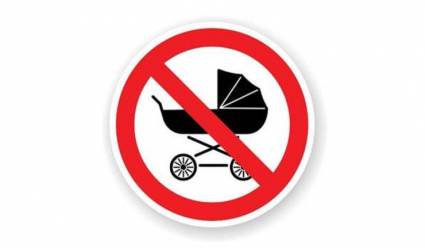
Contraceptive method. Autor: Juventud Rebelde Publicado: 13/05/2021 | 10:08 pm
Every time María Alejandra’s menstruation is late, she and her husband’s pulse quickens. The 35-year-old woman jokes that surely the female is coming, behind her boys, and he makes a face like he wants to pull his hair out, because “two are more than enough”. Then she returns to the subject that was almost forbidden that afternoon when he told her that he agreed to opt for male sterilization (vasectomy). However, it all remained a fleeting phrase.
“We had that conversation in front of my mother-in-law, who, upon hearing my proposal, screamed her head off,” says this Havana native, who currently uses condoms as the only contraceptive method, which was difficult to obtain more than a year ago.
There are many people who face the dilemma of finding the best way to control birth control or to put an end to their fertility. Ideally, the decision should be made in a consensual manner with the couple, but this is not always what prevails.
Family planning: a women’s issue?
The 48th edition of Cuba’s Health Statistical Yearbook -which contains updated information up to 2019- states that intrauterine devices (IUDs) had the highest percentage (52.2 percent in that year) of contraceptive coverage, followed by female sterilization (tubal ligation), which reached 22.6 percent in 2019.
According to that document, this last value is the highest recorded since 1995 (the date from which the comparisons start). Other contraceptive methods referred to were pills, injectables and condoms. It is worth noting that male sterilization was not included among the options, at least not reported.
So common, it seems natural to many people that birth control is mostly a female concern, even if there are men who are willing to take a leading role.
A survey conducted in the streets of Sancti Spiritus shows the prevailing patriarchal ideology that affects these decisions. Among the opinions identified with this type of concepts, those that stand out are those that maintain that women should worry more because men have children, but if they want to, they do not raise them; if they change their mind after tubal ligation, they can go to the doctor and he will always know what to do.
The “discomfort” involved in the use of condoms and the discomfort associated with IUDs were also mentioned. Another of the ideas naturalized by popular opinion is that “if a woman has a cesarean section, she takes advantage of it and gets her tubes tied”.
This is confirmed by Claudia Bernal Castillo, who opted for tubal ligation surgery. We didn’t even talk about it at home,” explains the 32-year-old. If we only wanted two children, and we already had them, why let that moment go by”.
This is one of the reasons that move patients to request the surgical procedure to the Sancti Spíritus doctors Omar Rangel and Miguel González Bellón, specialists in Gynecology and Obstetrics, who assure that it happens “as a consequence of machismo”.
“This is a definitive and irreversible method of family planning. Although the application of methods to reverse it has been registered, the predominant thing is the appearance of ectopic pregnancies, which are a danger for the woman”, says Bellón.
Dr. Rangel adds: “It is always explained that it is not necessary to perform the procedure during the cesarean section, because it is more invasive and can generate a greater number of maternal deaths, since it involves a surgical intervention. It can be performed laparoscopically -which is less invasive and less risky- 48 hours postpartum”.
The possibility of complications was what made Yaritza Cabrera, 36 years old and a resident of the capital, desist from this procedure, minutes before the cesarean section. “When they were preparing me for the operation, including the oxygen mask, I vomited and almost choked. I was afraid that my blood pressure would rise, because I became tachycardic, so I told the doctor: ‘Forget about the ligature,'” she recalls.
Although both physicians from Sancti Spiritus agree that requesting this procedure is a woman’s right, they recommend it, especially under certain circumstances. Dr. Rangel explains that it is done up to the age of 39 and 40, and never before the age of 24. He also states that it is sometimes necessary to perform it on multiparous patients, those with serious psychiatric problems, decompensated diabetics and those with renal insufficiency.
Both consider that there is an urgent need to improve the culture regarding the use of multiple contraceptive methods: mechanical, endocrine, implants, tablets, etc., so that surgical intervention is not recurrent. “In the family planning consultation, which should be attended as a couple, providers should be trained to provide guidance, according to all the possibilities, so that the best option is chosen,” concluded Dr. Bellón.
Can men decide?
Among the techniques used to write this report was a qualitative survey carried out in a private group created by this team for journalistic purposes (Experimento para textos periodísticos) on the social network Facebook, which is made up of 900 users residing in the country.
Most of the women acknowledged that when they decided to end their fertility through surgery, they made the decision alone, without consulting their partner. Some responded that they never thought of proposing to him to have a vasectomy, and it is noteworthy that several of them tried to negotiate to see which one would work best for them.
Several tried to negotiate to see which of the two would undergo the surgery, but it was not possible to reach an agreement. Two girls even proposed to their husbands to have it done and they were offended.
This is still a taboo subject,” says Yinet Córdova, from Holguín. I used condoms for many years because I couldn’t use other methods, and I gave them up when I was sterilized endoscopically, because my husband refused to have a vasectomy”.
For Rouslyn Navia, a resident of Havana, the story has not been much different. At 37 years old and with two children, she does not intend to get pregnant again. She did not opt for ligation during the cesarean section “for fear that the recovery would be more painful. Then I tried to negotiate with my husband to have the vasectomy, since he has several children. He did not agree.
Vasectomy is a surgical technique whose purpose is male sterilization, when the man has decided to put a definitive end to his fertility. However, urologist and andrologist Ramiro Fragas Valdés, specialist in Urology and master in Sexuality at the Cira García Central Clinic, in Havana, warns that, although it can be performed since the 1970s, “it is not practiced as much as it could be because, when couples are referred, they think more about tubal ligation, and because it is the woman who generally opts for sterilization. The idea is to change that, especially because vasectomy is a much simpler and less risky procedure for a man than tubal ligation is for a woman”.
One of the issues that prevent men from opting for this technique, in addition to prejudice, is misinformation. In the survey, most of the participants assured that they would not dare to have it done, and considered that the subject should have a greater presence in the media.
Although some said that “it is not a necessary method if the woman can get pregnant” and that “they say it is very painful”, it is striking that more than half of the men said that “it should be a more accessible option” and “information should be offered in family planning consultations and in sex education in schools”.
These opinions coincide with the opinion of Dr. Fragas, who believes that “if we break the taboo of machismo, if we make the method more widely known, and if we get family planning programs to offer it as an option to couples, vasectomy would be practiced much more than female sterilization, we would save resources, and we would save money. With female sterilization, we would save resources and take better care of women”.
Vasectomy: quick and precise
T is a middle-aged man, a doctor, from Havana and childless. He does not want to mention his name, but agrees to share his experience because, despite wanting to undergo the surgery for many years, it has not been possible for him to do so. For years, it has not been possible for him. He says that he never wanted to have offspring, which is why, since he was a medical student, he asked about that possibility.
“First, it was not feasible because I was very young,” he recalls. Then, because I had no children. Later, I was frightened by the unwillingness I found to receive help with postoperative pain management. When I told myself I could handle it, the childlessness story came back.
T’s doubts and concerns may be those of other men. That is why we asked Dr. Fragas, also a member of the board of directors of the Cuban Urology Society, about these issues. The specialist explains that “vasectomy is a very simple surgery that is performed in 15 minutes. The rest period is two or three days, and sexual activity can be resumed after a week”.
However, he believes it is necessary to be clear that “the reversal -in case the patient wants to have children later- takes at least two hours because it is done through microsurgery, and the results are not always favorable. Therefore, it is generally recommended for couples in which the man and the woman are over 35 years old. It cannot be a hasty decision and should be promoted among stable unions, with two children or more”.
Dr. Fragas has extensive experience in this type of surgery, and between the incisional method and the one that does not require a scalpel (Li technique), he prefers the latter, although in his opinion both are equally effective.
“There are patients who feel safer with the traditional technique, with a scalpel,” explains the doctor, who in 2009 presented in Barcelona a casuistry of approximately 400 patients who had undergone surgery, together with other experts. It is also very simple, and one or two small incisions are made. Li’s technique does not change much, but the fact that it does not use a scalpel, that it is performed through a single incision in the median raphe under local anesthesia, makes it more attractive”.
The urologist assures us that the experience of these men, when the doctor makes an appointment to see them to see how it went, is very favorable. “They are very happy with the method and recommend it as something safe and simple,” he says.
Dr. Iliana Armas Ampudia, First Degree Urology and MGI specialist, and member of the Provincial Infertility Consultation in Pinar del Río, corroborates her colleague’s explanation and adds:
“The patient walks in and out of the consultation and should not have any complications. However, it is a very unusual practice. In more than ten years in the specialty, I have barely performed four, and I have colleagues who have performed one or two. Society still has many taboos about these issues. Men should know that it does not affect virility: their erections will remain the same, as will their ejaculation, only free of spermatozoa”.
He also points out that “the couple should continue to take care of themselves for up to three months after the surgery to completely avoid any risk of pregnancy”.
Voices from experience
At the age of 67, Georgina Venegas, from Pinar del Río, remembers with gratitude the decision of her husband, journalist Rafael Cao, now deceased. He decided to have a vasectomy so that she would not have to undergo a ligation. It was the early 1990s, and Georgina had undergone two back-to-back terminations.
“We had one child together, and he had another from a first marriage. I had already turned 39, and I told him, ‘I’m going to have to tie the knot, unless you do.’ I just had to ask,” she says.
After a tenacious search in surgical records and operative reports by the nurses of the Urology service in Pinar del Río, this team managed to talk to Alfredo Miló, who underwent a vasectomy in 2019 to prevent his wife, already with two very complex pregnancies due to preeclampsia, from having to enter a salon again.
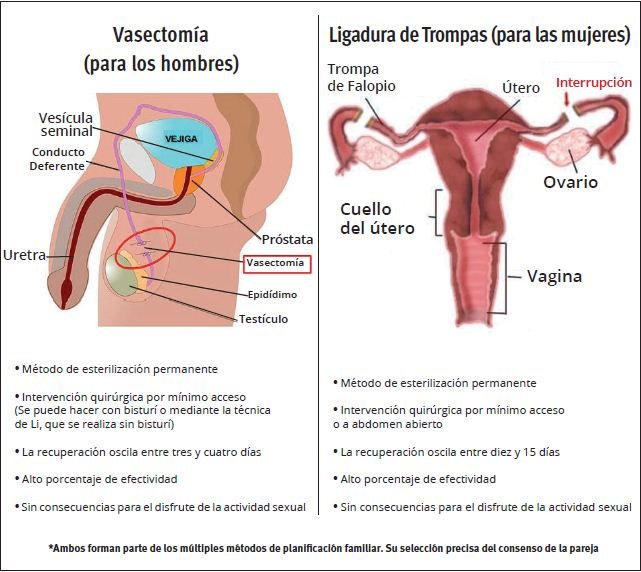
“Before deciding on a vasectomy, we looked at other alternative methods, but none of them satisfied us. I would tell her, ‘I don’t want you to go to the operating room,’ and she would say, ‘I do want you to go, but to have a vasectomy. Not knowing what it was like and with my machismo in front of me, I did not agree, and so we worked for several years, until I was convinced.
“During the operation I felt no pain. The recovery was perfect. I can tell those who doubt that vasectomy transports you to a world where worries are over.”
His wife, Yamilka Rodriguez, confesses that it was not at all easy to convince him, because “there was a lot of pressure from society and even from the family; even when he entered the salon they told him not to do it”.
Today, Yamilka says, not many people are surprised:
“Women ask me how I got her to have it done and men tell her: ‘You’re crazy, no woman deserves to have that done for them’. It is a deep-rooted machismo. In the face of that, I say that we are happy”.
As this is an issue that is discussed (when dialogue is achieved) within the couple, in the Family Planning Consultation of the municipality of Pinar del Río, each of the options available to avoid pregnancy is explained. In this regard, Dr. Lázara Medina Martínez, who has a diploma in Comprehensive Care for Women and a master’s degree in Communicable Diseases, points out that “vasectomy, in particular, is almost never accepted”.
From 2012 to date, during the time she has been working in this practice, only two couples have opted for this method, in both cases because the women had pathologies that prevented them from undergoing ligation.
Acts of love and responsibility
In sexual and coupled life, as in social life, everyone has their own contexts, realities and determinants. It is true that as a country we are gaining more and more information and debate on topics that have traditionally been considered off-limits, or only of interest to sectors such as women, in the case of birth control and the end of fertility; but as long as there are options that have not been taken advantage of because of macho cultural patterns, there is still much to communicate and discuss.
On this path, there is nothing better than to seek guidance from specialists and positive experiences. Fortunately, when one looks to the horizon, one finds examples such as those of Ernesto Herrera, from Holguín, who has just become a father. He is sure that, “when the time comes, vasectomy will be the option I will take. It is safer and less traumatic than a ligation for my wife. It is also an act of love.
Malicious Interests Against Cuba in the USA

Malicious interests behind U.S. campaign against Cuba denounced
No study provides scientific evidence that there were radiofrequency waves of high intensity in areas where diplomats were located, stresses Johana Tablada, deputy director-general of the U.S. Directorate of the Cuban Foreign Ministry (MINREX).
Author:

Juventud Rebelde |digital@juventudrebelde.cu
Translated and edited by Walter Lippmann for CubaNews.
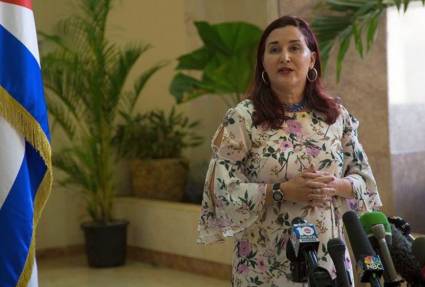
Tablada said that the group of experts from Cuba that investigated this issue explained why the thesis put forward most recently is an unlikely hypothesis Author: MINREX Published: 12/05/2021 | 08:49 am
Malicious interests are behind the campaign on the alleged Havana Syndrome, Johana Tablada, deputy director-general of the U.S. Directorate of the Cuban Foreign Ministry denounced today.
No report or study published in the United States, Cuba or the world provides scientific evidence that there were radiofrequency waves of great intensity in the area where the diplomats who reported health symptoms were located, said the official of the Ministry of Foreign Affairs (MINREX).
The only ones who won with this story are the members of a minority and reactionary group of politicians desperate and willing to resort to any means to try to impose and perpetuate the course of confrontation, lies and injustice in Washington’s policy against the Cuban people and the Americans themselves, she said.
Tablada maintained that the group of experts from Cuba that investigated this issue stated and explained why the thesis exposed most recently is an unlikely hypothesis, and certainly not a proven fact as the media and unidentified sources try to fix in people’s imagination.
She added that the Cuban Academy of Sciences disagreed on this possibility which she described as speculation presented as one more hypothesis, not supported by arguments in the body of the published report of the U.S. Academies of Sciences. The Americans themselves cannot assure what is the cause of the reported symptoms and the absence of information requested to the Washington government is critical, which limited their study.
The diplomat reiterated that the Academy of Sciences and the team of Cuban experts reject the politicization of the issue and recently reiterated the call for collaboration between both countries to solve the matter and establish the truth.
Tablada stressed that up to now the most concrete and factual thing we have seen is that symptoms were reported with such a diversity that even the State Department doctors explained, as well as the Cuban scientists, that so many elements cannot be attributed to a common cause.
The official recalled that the unfounded accusation against her country of the attacks served as a pretext for the withdrawal of most of the staff of the United States Embassy in Havana, in 2017, coupled with an unprecedented sequence of actions of hostility and setbacks in relations between the two countries and peoples.
She said that after the change of administration in the White House we are facing a new cycle of articles and leaks on the alleged existence of attacks, a word not used by official spokespersons of the Washington government in their most recent statements, according to PL. She pointed out that the common denominator of this set of publications is political speculation, manipulation and absence of primary sources and the misleading reference that assumes and presents as a true fact an alleged syndrome that was not proven by science.
The Deputy Director-General of the US Directorate of MINREX pointed out that there is no such thing as the Havana Syndrome outside of propaganda, but we live in a world, she stressed, in which perceptions matter more than realities.
She said that the investigations of the Federal Bureau of Investigation (FBI) and the Ministry of the Interior (Minint) of Cuba were serious and conclusive in ruling out the existence of ultrasonic or infrasonic sonic attacks.
Tablada stressed that Cuba has not questioned the existence of health symptoms, has investigated the issue from the police, medical and scientific spheres and has made many attempts and calls to cooperate by delivering information of its investigations to the U.S. government.
The diplomat concluded that the main victim of this whole saga seems to be again the truth. The measures taken on the basis of unconfirmed speculation have not been reversed and the suffering they have caused to the Cuban people, families and bilateral and people-to-people relations has only been aggravated, she said.
Recently, White House Press Secretary Jen Psaki said that agencies and departments across the federal government are working to address “unexplained health incidents” that are sometimes reported by different agencies and did not occur in one place.
Marco Rubio, of the Senate Foreign Relations Committee, insist on the so-called Havana Syndrome despite Cuba’s denial, supported by scientific studies, which categorically distances itself from such actions.
Men’s things… and women’s…

Men’s things… and women’s…
Masterfully conducted by Doctor in Historical Sciences Julio César González Pagés and directed by Yolanda Cabrales, a new proposal of Cubavisión channel has already put on the table two topics that generate a range of opinions: machismo and feminism.
Author: Aracelys Bedevia

Digital |digital@juventudrebelde.cu…
March 9, 2021
Translated and edited by Walter Lippmann for CubaNews.
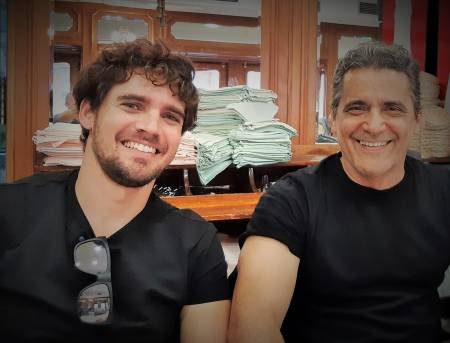
Julio César González Pagés (right) with Yonnier Angulo, who is in charge of the Men in Tangles section. Autor: Juventud Rebelde Publicado: 09/03/2021 | 09:16 pm
The enigma of femininity has made men of all times cavillers. [quibblers] —Sigmund Freud
One more step forward in the effort to build a more humane society, a victory for those of us who work and dream for a better world, represents the program Cosas de hombres [Men’s Things] which has been broadcast every Monday for the past two weeks at 10:15 p.m. on Cubavisión channel.
Masterfully conducted by Doctor in Historical Sciences Julio César González Pagés and directed by Yolanda Cabrales, the new proposal has already put on the table two topics that generate plurality of criteria: machismo and feminism. What is it? Are we or are we not?
The guests represent a wide range of professions and activities that relate male behaviors in different social spheres. Víctor Fowler (writer), Rochy Ameneiro (singer), Omar Franco (actor), David Blanco (singer), Norma Vasallo (university professor), Andrea Doimeadiós (actress) and Marilyn Solaya (filmmaker) have spoken with Pagés so far; all of them very committed to the struggle for egalitarian spaces where men and women have the same opportunities and are valued as human beings, regardless of sex.
In Men’s Things there will be, from the scientific area, research, communication and teaching, Félix Julio Alfonso, Patricia Arés, Clotilde Proveyer, Yulexis Almeida, Tania de Armas, Yonnier Angulo, Jesús Muñoz Machín, Andrei Hernández and Francisco Cruz. Alberto Roque, Lisandra Chaveco, Yohanka Rodney, Yosvel Hernández, Oni Acosta, Enmanuel George, Arlin Rodríguez and Neida Peñalver will also be present, said Julio César González Pagés to Sexo Sentido.
Edesio Alejandro, Cristian Alejandro, Maykel Blanco, Israel Rojas, Jan Cruz, Luis Franco, Jorge Luis Robaina (Karamba), Juan Carlos Rivero (Moncada), Ernesto Blanco, Adrián Berazaín and Raúl Torres will accompany the debate with music, acting and direction. The list includes Rodrigo García, Tony Ávila, Alberto Corona, Denis Ramos, Jorge Martínez, Maysel Bello, Lizette Vila, Marcos Herrera and Sebastián Milo. Representing the athletes will be multi medalist Victor Moya, in the high jump.
Dr. Pagés, leader of the Ibero-American and African Network of Masculinities (RIAM) and author of more than a dozen titles (Macho, varón, masculino and Por andar vestida de hombre, among others), says that “the idea came up in 2013 during a visit of director Yolanda Cabrales to my house.
“She had directed Ecos de mujer and wanted to create a space where men were the protagonists. In 2020 Rafael Pérez Insua, director of Cubavisión, called on us to rethink the project. With COVID-19 we had to look for alternatives. The original idea underwent changes, but gained nuances for discussion.”
-How much time will you be on screen and what other topics will you be discussing?
-We will discuss health, paternity, sexuality, violence… There will be 13 segments with a duration of 27 minutes, divided into four parts , with three guests and a section called Tangled Men, which is coordinated by Yonnier Angulo and addresses the impact of social networks on contemporary life and masculinities.
-We talk a lot about violence against women and very little about violence against men. Don’t you think that machismo is one of the reasons why this violence is invisible?
-One of the big obstacles is that women’s demands have been resisted by men who do not see them as a priority. A change of vision from hegemonic masculinities is to give them the prominent place in the effort to end inequalities in order to achieve a more equitable society.
“Revolutionary experiences have taught us that the inequalities suffered by women do not end with the end of capitalism, because there are men who are still interested in maintaining the subordination of women.
“Understanding the issue is complicated when a sector suggests that these demands can divert us from more urgent or important objectives at the national level or consider them sectoral demands, and believe that we can create the bonds of solidarity necessary to transform society without questioning male supremacy.
“More than defending men, it is about knowing [mens’] vulnerabilities and prioritizing an agenda that deconstructs the myths of [male] supremacy. We must first and foremost learn to be full humans in order to live in harmony and not be the source of so much violence and destruction.”
-Is it a good time for a program of this kind?
-Yes, it comes at an excellent time of changes in Cuban society. Laws related to our masculinities are being passed and it is important to be prepared for this. There is a great need to educate the population on the various questions related to masculinities and to offer ways to unlearn toxic macho values.
Show me your hair

Show me your hair, and I’ll tell you who you are?
The story aims to bring us closer to the life of Sarah Breedlove (who later became C.J. Walker when she remarried publicist Charles Walker and took his name for the business), the first African-American woman to achieve the status of a millionaire in the United States.
Author:

José Luis Estrada Betancourt |estrada@juventudrebelde.cu
March 8, 2021
Translated and edited by Walter Lippmann for CubaNews.

Madam C.J. Walker. Autor: MagaZinema Publicado: 08/03/2021 | 10:44 pm
I couldn’t help but think of my mother as soon as I started watching Madam C. J. Walker: Self Made: Inspired by the Life of Madam C.J. Walker, the miniseries released by Netflix in 2020 and now broadcast by Cubavisión on Saturdays at around 9:15 p.m. And not only because the extraordinary actress Octavia Spencer brings my Juana to mind, but because the story she stars in and for which she was nominated for Emmy awards, brought me back to those years of my childhood in which so many times I found the mistress of my days girdled with a hot comb to smooth her hair soaked in fat smelly grease.
It frightened me that I had to try, by fire, to make them find her beautiful, sliding that red-hot iron through the bundle of strong and unruly hair that she inherited from our ancestors, to leave them shiny and straight. I preferred to leave so as not to witness a possible accident, an alternative that did not disappear when it was the turn of the curling iron and the curl began to bend in a more permanent way with a chemical treatment that does not even spare the scalp.
I didn’t even wonder then what would be wrong with natural hair. It seemed to me the most common thing in the world that some people wanted to “advance the breed”, or that, before inquiring about their health, they were concerned with finding out how the newborn had turned out: It is evident that I was not ready to understand then that the centuries of slavery, of colonialism, imposed a Eurocentrism that later capitalism and imperialism were in charge of accentuating, to the point that this racist concept, which is so discriminatory, is so impregnated in my mind, that I was not ready to understand then that the centuries of slavery, of colonialism, imposed a Eurocentrism that later capitalism and imperialism were in charge of accentuating, to the point that this racist concept, discriminatory, is so impregnated in us (still today) that it can be common that in many spaces what does not comply with the “white beauty” is taken as dirty, unkempt, inappropriate, unprofessional, and is associated with poverty and marginality.
Undoubtedly, the theory of the existence of human races (over time up to 63 were classified, although Cuba must have surpassed that figure with so many mulattoes, mulatos blanconazos, jabaos, capirros, Indians…) was a great “invention” for those who sought to establish their social and cultural supremacy. The truth is that, although scientifically it has been destroyed, the direct derivative of this concept: racism, has not disappeared at all.
Madam C. J. Walker: A Self-Made Woman, a story that aims to bring us closer to the life of Sarah Breedlove (who later became C.J. Walker when she remarried publicist Charles Walker and took his name for her business), the first African-American woman to achieve the status of millionaire in the United States, could speak more forcefully about all of this, but does not.
However, viewers should not think that they will get to know much about this revered figure by African Americans with the four 45-minute chapters that Netflix offers us, because suddenly we will find her as a notable businesswoman and philanthropist when in a scene filmed in broad daylight, we discover her dressed in beautiful blue, as if she were dressed for an Oscar award ceremony, protecting herself from the sun, strolling outside her mansion where she will be noticed by her neighbor Rockefeller.

Blair Underwood as Charles Walker.
“To whom God gave it…”, those who think I’m envious are probably thinking right now. It’s just that no divine force must have given her anything, but she certainly had to fight very hard to be able to create an empire in the cosmetics industry with hair products. How did a black woman, who came into the world in 1867, on a cotton plantation in Louisiana, orphaned at the age of seven, more than poor, without any education, a domestic servant who lost her knuckles washing, manage to impose herself in a United States living in full racial segregation, in that lamentable period (1877-1950) when more than 4,400 African-Americans were victims of terrible lynchings? How was she able to achieve this, subjected to men, as women were in the early years of the 20th century, and despised for her sex and her skin?
We will not know it from the series Madam C. J. Walker... It will remain as a pending task to approach in depth the existence of this totally unknown woman (at least for me). In this production, such historical context is just a postcard in the background. Of course, we will be moved by the image of some being hanging in a tree, but the story of the protagonist played by Spencer will move along other paths.
It begins when the beautiful Addie Munroe (Carmen Ejogo), a mulatto whose white genes gave her a long and abundant mane, is shown before Sarah with the “crecepelo”, a product that will not only solve her hair loss problems, but will also give her back, above all, her self-esteem. Seeing that it works, the future tycoon, excited, will propose to her savior to let her participate in the sale, but the first one, who in a “rapture of kindness” provided it, was not willing to give that miracle to darker people with bad hair. Just what writer Alice Walker (The Color Purple) calls “colorism” to describe that other expression of “internal” racism.
You don’t have to be too imaginative to know how the script will develop in the future: Sarah and Addie, who will give her one setback after another, will become bitter enemies, although those who are familiar with Madam C. J. Walker’s biography assure that this is one of the many licenses taken by the authors of the scripts, in order to provide the ingredients that would make the melodrama move forward in the right direction.
In fact, if one is to go by the events presented to us from the novel On Her Own Ground, by A’Lelia Bundles, on which this biopic is based, Madam C. J. Walker, rather than the enormous injustices that African-Americans had to face in the early 20th century, was made more difficult by Addie (who, let’s face it, ended up stealing her invention, which she miraculously copied and obtained) and the men around her – such as Charles Walker (Blair Underwood), the husband jealous of his wife’s success; and John (J. Alphonse Nicholson), the ungrateful husband of her daughter, Leila Walker (Tiffany Haddish). She becomes betrayed, even by some of the very women to whom she gave support and work…. Nothing, the series seems to reinforce the popular saying that there is no worse wedge than the wedge of one’s own stick.
In any case, the undeniable fact is that with her efforts Madam C. J. Walker overcame poverty, humiliation, discrimination, classist and sexist prejudices… to rise as a true exponent of the American dream and to honor the title of this dramatization that was released in March, just two months before George Floyd ended up dead under the knee of ex-cop Derek Chauvin.
For me, Madam C. J. Walker: A Self-Made Woman stands out, above all, for the superb performance of Octavia Spencer (who also serves as executive producer), ever so believable, ever so convincing. Yes, Spencer is an actress of the highest caliber. She reminded us again this Sunday thanks to the film Hidden Figures, which was put on by Arte 7. We saw her, as splendid as her two other co-stars (Taraji P. Henson and Janelle Monáe), also with her hair ironed, chemically straightened or in wigs, because that’s what is generally expected of black actresses and models on TV or in the movies. As beautiful as diversity is! But it is difficult to overthrow what has been coined for so many years in the sociocultural field.
Diaz-Canel speech to Ibero-American Summit

In Cuba, science and innovation have been key factors in the development process and social justice objectives.
An inclusive Ibero-America, which takes into account the interests and development needs of all members of this Conference, can favor the advancement of our nations, stressed the President of Cuba, Miguel Díaz-Canel.
Author:

Juventud Rebelde
|digital@juventudrebelde.cu
Translated and edited by Walter Lippmann for CubaNews.
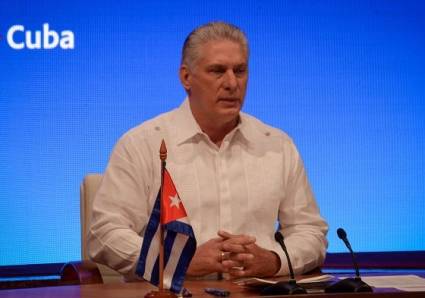
The legitimacy of a government emanates from the expressed and sovereign will of its people. Autor: Estudios Revolución Publicado: 21/04/2021 | 10:35 pm
Speech by Miguel Mario Díaz-Canel Bermúdez, First Secretary of the Central Committee of the Communist Party of Cuba and President of the Republic, at the XXVII Ibero-American Summit of Heads of State and Government, on April 21, 2021, “Year 63 of the Revolution”.
His Excellency Xavier Espot Zamora, Head of Government of the Principality of Andorra;
His Majesty Felipe VI;
Your Excellencies Heads of State and Government of Ibero-America and other heads of delegations; Your Excellency Rebeca Grynspan, Ibero-American Secretary-General:
Please receive cordial greetings on behalf of the Cuban people and Government.
The efforts of the Principality of Andorra to organize this Summit and to give continuity to the work of the Ibero-American Conference, in the period that is coming to an end, under the exceptional conditions imposed by COVID-19, must be acknowledged and thanked.
Our congratulations and support to the sister Dominican Republic, next Pro Tempore Secretariat.
Excellencies:
Cuba has experiences to show and attaches special relevance to the theme of this appointment: “Innovation for Sustainable Development-Objective 2030. Ibero-America facing the challenge of the Coronavirus”.
In barely a year, a devastating pandemic has worsened the living conditions of millions of human beings on the planet and caused the worst economic downturn in nine decades¹. In contrast, five years after its adoption, hardly any progress has been made in the implementation of the 2030 Agenda.
There is talk of the multiple crises generated by COVID-19, but some problems are dozens of years older.
Developing countries are burdened with the unbearable weight of a foreign debt that has already been paid a thousand times over, and some of them are also suffering the impact of unilateral coercive measures that violate international law and hinder their legitimate right to development.
Until a just, democratic and equitable international economic order can be established to address the root causes of inequalities and move towards the Sustainable Development Goals, these will remain a chimera for most of the world’s peoples.
Let us be honest. The current development paradigms cause poverty and exclusion of the majority due to their irrational patterns of production and consumption that, under the designs of the market, disdain the most valuable thing: human life and dignity.
An inclusive Ibero-America, which takes into account the interests and development needs of all the members of this Conference, can favor the progress of our nations.
Sustainable development demands political will, solidarity, cooperation, financial and technology transfers from developed countries and equitable access to these resources that takes into account accumulated inequalities.
The pandemic has laid bare an indisputable truth: health and social protection systems, education, science, technology and available material resources must be put at the service of all and not at the mercy of the narrow interests of a few. Regardless of ideologies, the State has a responsibility to assume in the use of resources associated with the life and well-being of citizens.
As I explained at the Ibero-American Summit in Veracruz in 2014, in Cuba, science and innovation have been key factors in the development process and social justice objectives. This premise, which is a fundamental part of the legacy of the historic leader of the Cuban Revolution, Commander in Chief Fidel Castro Ruz, has allowed us to face the current pandemic under the blockade.
A robust system of science and technological innovation with an advanced and efficient biotechnological and pharmaceutical industry, allied to the universal, free and quality health system, with highly specialized human resources, have made possible the Cuban response to the pandemic that seems to surprise some.
A little more than a year after the first cases of COVID-19 were detected in the country, we have five vaccine candidates, two of them, Soberana 02 and Abdala, in Phase III clinical trials and we hope to immunize the entire Cuban population before the end of 2021, with our own vaccines.
Our National Economic and Social Development Plan until 2030, aligned with the Sustainable Development Goals, gives a leading role to innovation and scientific research.
The links between government structures and the knowledge and goods and services production sectors have been strengthened to promote innovation for economic and social development, with emphasis on local development.
Cuba has 229 Science, Technology and Innovation entities, of which 141 are Research Centers, 26 Scientific and Technological Services Centers, 61 Development and Innovation Units and a Science and Technology Park², and at the same time it is developing a Government Management System based on Science and Innovation.
The Government of the United States, in the midst of the pandemic, brutally tightened the economic, commercial and financial blockade, and financed and supported dangerous acts of violence and disrespect for the law to promote social and political instability in our country. The Cuban people have responded by redoubling their proverbial resistance to the blow of creativity.
The campaigns of the U.S. Government to discredit and boycott the medical cooperation that Cuba offers have not tarnished our vocation of solidarity and cooperation: 57 medical brigades of the Henry Reeve Contingent have contributed to confront the pandemic in 40 countries and territories. Many of the members of this Conference have appreciated the high altruism of Cuban health professionals.
Excellencies:
The legitimacy of a government emanates from the expressed and sovereign will of its people, not from the recognition of foreign powers. The Government presided over by the constitutional President Nicolás Maduro Moros must be respected.
It is unfair to blame the Venezuelan Government for the economic and social situation facing Venezuela, when the application of cruel unilateral coercive measures, planned and implemented by the United States accompanied by several of its allies, with the aim of causing suffering among the population, continues. These coercive measures promote emigration, a phenomenon about which some express great concern and could contribute to resolving its cause.
It would be useful and sincere to recognize that the U.S. design of intervention in Venezuela failed miserably and placed other countries that supported it in an untenable political and legal situation.
Those who claim to respect the will of the Venezuelan people and promote a political solution among Venezuelans should recognize that the Bolivarian Republic of Venezuela is a sovereign state, cease meddling and act with respect for the United Nations Charter and the Proclamation of Latin America and the Caribbean as a Zone of Peace.
Excellencies:
On behalf of the Cuban people, I am grateful for the traditional support of the Ibero-American community for the just demand to put an end to the blockade against Cuba, as well as the signs of rejection to the arbitrary and unilateral qualification of our country as a sponsor of terrorism, by the Government of the United States.
Cuba maintains unchanged its policy of solidarity and international cooperation for the benefit of our peoples, and will never renounce the construction of a sovereign, independent, socialist, democratic, prosperous and sustainable nation, always ready to share, as a human heritage, the results of our experiences based on Science and Innovation.
Thank you very much to all of you.
Taken from the Report: “The Inequality Virus”, published by OXFAM on January 25, 2021 and available at: https://www.oxfam.org/es/informes/el-virus-de-la-desigualdad
Data provided by Citma’s International Relations Department.
Inequality Exposed in the Face of Covid-19

Inequality also surfaces in the face of the pandemic
Immunizing their populations may be as difficult for many states as the COVID-19 scourge itself.
Posted: Saturday 27 February 2021 | 08:16:08 pm.
Author:  Marina Menéndez Quintero | marina@juventudrebelde.cu
Marina Menéndez Quintero | marina@juventudrebelde.cu
Translated and edited by Walter Lippmann for CubaNews.
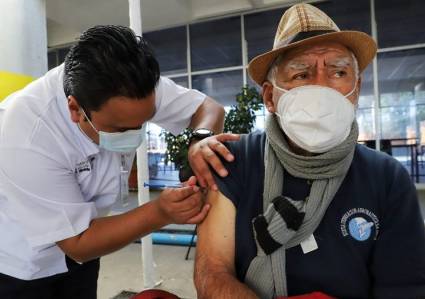
The arrival of Sputnik V was received with enthusiasm in the Mexican capital. Autor: @ClaudiaShein Published: 27/02/2021 | 07:48 pm
Assets, buildings and even military bases. What no country would put at stake, should serve as a guarantee against possible legal claims…
Abusive demands, some said; others sniffed out a hypothetical ulterior motive, and third parties even concluded that such far-reaching forecasts showed too much distrust of the manufacturer’s own product.
What is palpable is that the revelations about the unimaginable conditions that the pharmaceutical company Pfizer has imposed on Latin American countries in order to sell its vaccine against COVID-19, are a clear illustration of the concerns expressed by the World Health Organization (WHO) and by the UN Secretary General himself, about the difficulties that poor nations will have to face in order to immunize their populations.
“I must be frank: the world is on the brink of catastrophic moral failure, and the price of this failure will be paid in the lives and livelihoods of the poorest countries,” warned Tedros Adhanom Ghebreyesus, director general of the WHO, last month, drawing attention to the huge inequality in access to vaccines around the world.
UN Secretary General Antonio Guterres reiterated warnings about how inequity caused by the unfair global economic order and lack of cooperation will once again prey on the poor – now in the face of a deadly threat as direct as the pandemic – when he criticized what he called the “grossly unequal and unfair” distribution of the vaccine.
At that time, he pointed out, only ten countries had administered 75 percent of all the doses distributed worldwide, while more than 130 countries had yet to receive a single dose.
In this context, the revelations made public a few days ago by The Bureau of Investigative Journalism (TBIJ) – a news organization dedicated to investigative journalism based in London – and the Peruvian media Ojo Público, based in Lima, about the difficult negotiations of nations such as Argentina and Brazil to acquire the vaccine produced by the pharmaceutical company Pfizer, acquire support.
Their harsh and unusual demands illustrate the additional obstacles that resource-poor nations, including those more solvent ones that have not produced their own vaccine, may face, beyond the lack of current money.
As the journalistic investigation acknowledged, “most governments offer indemnification (exemption from legal liability) to the vaccine manufacturers they buy from.”
That is, the government would pay for any lawsuits against the manufacturer that a vaccinated person might file. “This is fairly typical of vaccines administered in a pandemic,” he noted, even though adverse effects are very rare.
However, Pfizer’s demands for Argentina and another nation, whose representatives have remained anonymous because negotiations are continuing, went further, asking for additional indemnification against any claims, officials in Buenos Aires said.
After representatives of the southern cone nation had negotiated difficult requirements that demanded changes in its legislation, Pfizer went so far as to demand “that the sovereign assets be part of the legal backing,” said a participant in the negotiation.
This happened at the end of December. It involved the Argentine government putting up its sovereign assets – which could include federal bank reserves, embassy buildings or military bases – as collateral against potential claims.
“We offered to pay millions of doses in advance, we accepted this international insurance, but the last request was extraordinary (…). It was an extreme demand that I had only heard when it was necessary to negotiate the foreign debt; but in that case, as in this one, we rejected it immediately”, the source affirmed.
Similar conditions were imposed to countries such as Brazil, where there were no agreements until today.
According to a message on Twitter by Misión Verdad, nine countries in Latin America and the Caribbean have reached agreements with Pfizer.
Although the tweet states that “the terms of these commercial agreements are not known” -and in truth it is information that in many cases is confidential-, the investigation by The Bureau… and Ojo Público gives an account of the rigors faced by Peru, and the “set of binding conditions” that it had to sign to close the agreement.
These included a supreme executive decree by which the nation committed to submit to international arbitration if disputes arose in the contracts for the purchase of the lots. At the same time, Peru waived “the sovereign immunity of the State for the enforcement of an arbitration decision”.
Contacted by The Bureau…, Pfizer declined to discuss the ongoing private negotiations, but argued that it has allocated doses to low- and middle-income countries at not-for-profit prices, including an advance purchase agreement to supply up to 40 million doses to Covax: a UN-sponsored project, and the only one worldwide that aims to facilitate access to vaccines for poor countries.
Meanwhile, vaccines that were initially viewed with apprehension, such as the Russian Sputnik V, are increasingly being used in Latin American countries.
Although Mexico has also acquired the Pfizer vaccine, in a message published on Twitter on the 23rd, Foreign Minister Marcelo Ebrard thanked President Vladimir Putin, the Russian Foreign Minister and the Ambassador in his country “for their support in making possible the arrival of Sputnik V vaccines to our country. Mexico-Russia friendship grows stronger,” he wrote. More than 20 million doses arrived from Moscow, far exceeding the thousands of vaccines from other companies that had arrived until then.
It is known that Sputnik V has also been acquired by Venezuela, Argentina, Paraguay, Colombia and Bolivia. In Peru its acquisition has been recommended and it has been reported that Brazil is planning to buy it, while it was expected to arrive in Chile. Reports state that in Ecuador contacts have been maintained with suppliers.
Meanwhile, reports from the Russian Embassy in Mexico state that the Russian Direct Investment Fund is looking for allies to produce Sputnik V in that Latin American nation.
In the midst of so much selfishness, the purpose could be evidence of humanistic logic. Mexico is the second country in the Americas with the second highest death rate from COVID-19.
But there is no shortage of people who appreciate the growing presence of Sputnik V as an expression of Moscow’s growing influence in the region.
Cooperation is needed
One hundred and eighty nations have endorsed the Covax initiative, which needs the help of rich countries to provide the funds to buy the drug. Ghana became the first country to receive a batch this week.
However, the pace may be very slow. According to officials involved in the initiative, the aim through Covax is to be able to vaccinate just 20 percent of the most vulnerable population in each participating country by the end of this year.
The People’s Vaccine Alliance coalition, a network of organizations including Amnesty International, Oxfam and Global Justice Now, estimates that nearly 70 low-income countries could vaccinate only one in ten citizens.
The response from potential donors is still not registering at the required level. Dr. Tedros explained that vaccines can only be delivered to Covax member countries if rich nations cooperate and honor contracts, referring to commitments made by the United States and the European Union to significantly increase their contribution.
On the other hand, regional solidarity initiatives are trying to help and could be very effective if they were more generalized.
An example of cooperation actions that could help is provided by ALBA-TCP (Bolivarian Alliance for the Peoples of Our America and the Peoples’ Trade Agreement), whose Bank announced in December – by the decision of the most recent Summit – the creation of a modest fund of two million dollars as financial relief to member countries that needed to acquire the vaccine and had not concluded negotiations with the supplying companies due to lack of money.
The availability or otherwise of the vaccine by all nations will be absolutely decisive in the planet’s triumph over the pandemic. Faced with COVID-19, we will either all emerge or we will all stagnate.
Cuba to immunize its entire population

Cuba will be among the first countries to immunize its entire population.
Speaking at the Round Table space, the president of BioCubaFarma said that the vaccine production and distribution capacities have already been analyzed and organized for their programming until next December, once the studies of the four vaccine candidates yield the expected satisfactory results.
Published: Thursday 04 February 2021 | 11:43:53 pm.
Author: Ana Maria Dominguez Cruz

Translated and edited by Walter Lippmann for CubaNews.
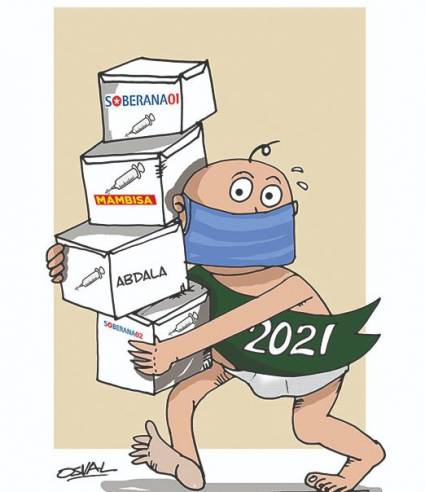
Cuba develops four vaccine candidates against COVID-19.
The confidence that Cuba will be one of the first countries that will be able to immunize its entire population from its existing capacities of production and distribution of vaccines against COVID-19 came this Thursday at the Round Table, dedicated to the subject.
Eduardo Martínez Díaz, president of BioCubaFarma, explained this while speaking on the radio-TV program, together with Marta Ayala Ávila, general director of the Center for Genetic Engineering and Biotechnology; Vicente Vérez Bencomo, general director of the Finlay Institute of Vaccines, and Eduardo Ojito Magaz, general director of the Center for Molecular Immunology.
Likewise, Mr. Martínez Díaz pointed out that they have already been analyzed and organized for their programming until next December, once the studies of the four vaccine candidates yield the expected satisfactory results.
He said that our scientists are working on four vaccine candidates at the same time because they all use the same type of antigen, so that the desired immune response can be achieved in all cases.
In addition, he explained that all the genetic information has been inserted in bacteria, yeast and cells of higher organisms, such as mammals, and that in the latest variants encouraging results were achieved which allowed advancing in that direction. Each one will differentiate the formulation of the vaccines, based on platforms used in previous vaccines with marked effectiveness and safety.
The President of BioCubaFarma said that “the vaccines are working well”, but we still cannot say that they are effective, “that is why we have to continue with the studies. We cannot bet on a variant and then the studies not give the expected results. In that case, we would have to start all over again”.
He emphasized that the production of several vaccines could be deployed at the same time, in case the expected results were obtained in all of them, and then the doses would be studied, according to each population group, as well as the possibility of assigning some of them to the treatment of COVID-19 convalescents.
He pointed out that, as an advantage, Cuban vaccines do not require large refrigeration chains, but temperatures of two to eight degrees Celsius. In addition, they allow for the application of successive booster doses, which is essential in view of the appearance of new variants of the virus.
Martinez Diaz insisted that it is not possible to acquire vaccines produced by other countries because there is not enough quantity to do so. “To date, only 108 million doses have been applied, which means that only a little more than one percent of the population has been vaccinated. Only 13 countries have applied more than one million doses of vaccine, including the United States and China.”
He stressed the need for an increase in the global vaccination rate and for prices to fall, so that the entire population has the possibility of protecting itself, including those living in poor countries.
COMMENTS ON WEB PAGE (Unedited):
Jorge Puerto
Friday 05 February 2021 | 07:42:28 am.
Encouraging news.
Reply
Valo
Friday 05 February 2021 | 08:22:45 am.
Bravo for Cuba. congratulations to all Cuban scientists.
Reply
Neosan72
Friday 05 February 2021 | 09:58:48 am.
The incorrect headline should read CUBA will vaccinate 100 percent of the population at the conclusion of clinical trials because you dare to anticipate events without having an idea of the effectiveness of the current vaccine projects It is very easy to write without delving into the matter and violate international procedures this can steal much credibility to the work of all scientists of our nation and I’m sure you do not have the information on the percentage of effectiveness and immunological load generated by such vaccine candidates.
Reply
Leo
Friday 05 February 2021 | 12:59:33 pm.
Hi all. I believe and trust in Cuban science and also in the managers and scientists who are in charge. If they say so it is because they know. My congratulations and hopefully they will be ready and only when they should be, not in a hurry. Greetings, Leo
Reply
neisicruz
Friday 05 February 2021 | 02:43:30 pm.
I trust in Cuban medicine, in our scientists, in the Revolution. Thank you for the effort you make every day.
Reply
Zuleika machado gomez
Friday 05 February 2021 | 06:30:39 pm.
I would like to congratulate the collective of scientists as always putting their intellect and dedication in favor of the health of our people. Let’s hope that our people continue to comply with the measures because unfortunately there are many irresponsible people who discard the established measures putting at risk their health and that of others. Without thinking that there are so many people involved in this fight who spend many days away from their families the medical and paramedical personnel who are on the front line to the cooks nurses drivers etc who are also working and can be infected who have families . To them our most sincere respect. And to the scientists of this important project a thousand blessings. And our immense gratitude . ????????????????????????????????????????????????????????????????????????????????♥️♥️♥️♥️
Reply
Nery Pila
Friday 05 February 2021 | 11:11:21 pm.
The universal desire to be able to have the certainty of being vaccinated efficiently and effectively against Covid is immediate, but the certainty of Cuban scientists that we will have our population and who knows how many more internationally as usual is firm and certain. Congratulations to our scientists. I trust
Reply
Ariel
Saturday 06 February 2021 | 11:21:25 am.
Israel has already vaccinated 80 ? of its population and for free, Cuba may vaccinate its entire population but still can not be given time, we must first confirm the results of their vaccines. Let’s not be sensationalist, let’s stick to reality, so that we don’t see previous campaigns on various issues that later are not fulfilled.
Reply
Raider
Saturday 06 February 2021 | 12:46:17 pm.
Since we will be among the first who will be the other nations at the top of that list and with which vaccines have they procured vaccination?
The Virus of Inequality

The virus of inequality or inequality in the virus
Two reports warn of a truth, the deadly Covid-19 pandemic has increased inequities and global differences and although anyone can get sick, those with lower incomes add up much more in the statistics, are poorer and will have less access to the hopeful vaccine …
Author: Juana Carrasco Martin

Translated and edited by Walter Lippmann for CubaNews.
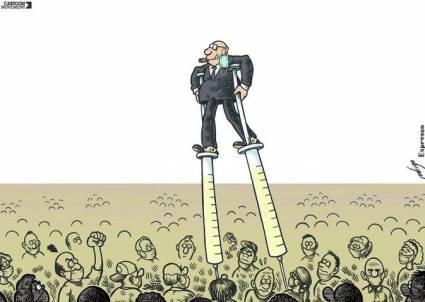
The combined wealth of ten of the world’s richest people could pay for vaccines to immunize everyone Author: Twitter Published: 02/02/2021 | 03:38 pm
Oxfam has been adamant that the combined wealth of the world’s ten richest people could pay for vaccines to immunize the entire world. At the same time, the International Labor Organization stated in a report that the Covid-19 pandemic has caused the loss of 255 million jobs.
Social inequity, unequal opportunities to access goods and services such as housing, education or health are among the consequences of the world’s health situation, where more than 103 million people have fallen ill and more than two million have died, and the count continues, while the vaccines already in use, which are not enough and are the object of disputes between first world countries that can afford them and are among their manufacturers, do not seem to be distributed fairly….
Those who have called it the virus of inequality are right. Here are some data that prove it.
The Oxfam report is titled “The Inequality Virus: Reuniting a coronavirus-torn world through a fair, just and sustainable economy,” and it announces all that it means and is needed.
Paul O’Brien, vice president of Oxfam America, in an interview with Democracy Now, noted of the pandemic situation: “The 10 richest people ended up making half a trillion dollars during the pandemic. The richest thousand got back all the money they lost in the pandemic, and they reached the same level of wealth in nine months. But at the same time, it has been disastrous for people at the extreme end of poverty.”
The report of this international confederation of 19 non-governmental organizations, which carry out humanitarian work in 90 countries under the slogan “working with others to combat poverty and suffering”, as they describe it on the Internet, warns that in the face of these exorbitant profits of billionaires, poor people will not recover from the economic and health crisis for at least a decade. If it does, it should be noted.
“In every country we looked at, inequality has worsened during the pandemic,” O’Brien added.
The Economic Commission for Latin America and the Caribbean (ECLAC) pointed out that this economic crisis and the slow exit from it will lead to the closure of 2.7 million companies in the region alone and some 8.5 million more workers will lose their jobs, in an emergency that by 2020 had already led to a significant drop in growth and economic contraction.
The economic recovery will be fragile and uneven, is the sharp forecast of ECLAC; the painful conclusion for millions of Latin Americans and Caribbeans who were already going through a limited growth, to which now add the consequences of the pandemic as the lower export of raw materials and the collapse of tourism, among other indices in decline.
ECLAC’s Executive Secretary, Alicia Bárcena, added other significant data in red: 54 percent of the region’s labor force does not have social protection or access to public health services.
Of this proportion, 57 percent are women, and this index added an aggravating factor that is reproduced in other regions of the world, even in developed countries. The International Labor Organization also brought its concerns to the 51st World Economic Forum in Davos, which met virtually this week and not in its usual snowy retreat in the Swiss Alps.
Globally, the pandemic cost workers $3.7 trillion in lost income and the destruction of the equivalent of 255 million jobs in 2020, four times the impact of the 2009 global financial crisis, the ILO reported.
But the summit meeting of politicians, businessmen and representatives of social and cultural organizations, which this time did not take place as usual in Thomas Mann’s Magic Mountain, did not exactly provide prodigious solutions at a peremptory moment for the planet. On the contrary, the widespread resurgence of the coronavirus, and even the new strains, highlighted the old weaknesses of health systems around the world, the injustices, the inaccessibility to medical care and vaccination that should be for everyone.
The slogan “The Great Reset” was crushed by an avalanche, and in this January 2021, as in the novel of the great writer, the problems discussed at the Davos Forum and the lack of intention to address them from what is fair, can be seen as the decadence of a way of life where the selfishness of those who only count profits in their finances over world health takes precedence.
The pandemic is conjunctural, although of extreme gravity. That is why its combination with structural problems, the same ones year after year, multiply the effects of inequity.
Check it out in these statements by Ursula von der Leyen, president of the European Commission, when the bloc intensified stricter monitoring of vaccine exports to countries outside the union. This is the case of the United Kingdom, because they had invested billions of euros and that “companies must now deliver” their vaccines to the 27 member states. “… We will set up a transparency mechanism for vaccine exports. Europe is determined to contribute. But it also means business.”
Ultimately that is the transparent truth,. The EU is a union of high-income rich countries, home to 342 billionaires; however, 123 million people at risk of poverty also reside there, Oxfam reported.
So what should we leave for the always neglected Africa? Cyril Ramaphosa, president of the African Union and of South Africa – one of the countries most affected by the coronavirus and even contributing a new strain, apparently of greater spread and lethality -, during his speaks at the 51st edition of the Davos Economic Forum, rightly criticized what he defined as “vaccine nationalism”, that is, the implementation of this selfish and inhuman attitude of hoarding, which hinders an equitable distribution of vaccines. “The rich countries of the world went out and acquired large doses (…) Some even acquired up to four times more than what their population needs excluding other countries”, a denunciation that he joined to the substantial comment: an increase in poverty is “expected for the first time in decades” and added, “the challenges we face were not created by the virus, they were created by us”.
You and I are not “us”, it is clear who fall into that category in the current pandemic and in the ancestral ills of that continent, the most powerful nations of the world that were colonial or neo-colonial empires.
The AFP news agency commented in this regard that bilateral agreements between governments and companies manufacturing vaccines against the Covid-19 virus could raise the prices of the drug and limit its supply to some regions.
Of course, the EU is not alone in this hoarding, where the United States and Donald Trump’s promise-threat that his country would be the first to be immunized and the willingness to buy all the vaccines produced in the world takes the lead.
Ramaphosa ratified the necessary denunciation: “We are concerned about vaccine nationalism (…) The rich countries of the world are holding on to these vaccines and we say: release the excess vaccines you have ordered and stockpiled”.
Reuters reported these days that the United Kingdom ordered 367 million doses of seven different vaccines for its population of approximately 67 million inhabitants, and the European Union secured almost 2.3 billion doses for a population of 450 million inhabitants.
However, the African continent, with some 1.3 billion inhabitants, barely completed 600 million doses of the international vaccine Covax, under the aegis of the WHO, which is also being requested by the rich countries.
We are faced with the confirmed presence of inequality in the midst of the terrible coronavirus.
Biden, new U.S. president in turbulent times

Biden, new U.S. president in turbulent times
The president called for unity to heal old wrongs and made clear the “leadership” of that country for world “democracy”

By Juana Carrasco Martin| juana@juventudrebelde.cu
Published: Thursday 21 January 2021 | 12:10:53 am
Translated and edited by Walter Lippmann for CubaNews.

Inauguration of Joe Biden and Kamala Harris Photo: The Guardian Posted: o1/21/2021 | 12:04 am
They say that the color purple stood out at the inauguration of the 46th president of the United States, Joseph Robinette Biden Jr. The purple achieved with the mixture of red and blue -which distinguishes the Republican and Democratic parties-, symbolized in this case the search for a national unity so necessary for a good internal climate in the country. The US has supposedly reached the limit of division and chaos by the one who is already characterized as the worst leader in history, Donald Trump, who in order not to lose his egomaniacal habit said as a farewell: “I will come back somehow”.
It is a show, a spectacle of “democracy,” the presidential and vice presidential swearing-in ceremony. As such – this time without the usual crowds due to the COVID-19 pandemic, but replaced by 200,000 flags from the bars and stars located from the Lincoln Memorial to the Capitol – they heard popular entertainment industry figures such as Lady Gaga, performing the National Anthem in the area outside the Capitol, to Jennifer Lopez and Garth Brooks.
In the midst of this staging to glorify the great nation, the ceremony was opened by Senator Amy Koblucher, who gave way to Missouri Republican Roy Blunt, both of whom insisted on conciliation after the events of January 6. Their status as the top members of the Senate Rules Committee gave them that task.
Sonia Sotomayor, -the first Latina Supreme Court justice-, then swore in the first African-American, Asian, American and woman to become Vice President of the United States, the then Senator Kamala Harris, as an emblematic example of the possibilities of the American dream.
The Vice President said in her pledge that she will preserve and protect the Constitution against all enemies, domestic and foreign. This is an undeniable allusion to the events of January 6, when violent pro-Trump fanatics stormed the Capitol, a matter under investigation that is likely to leave many loose ends when it is concluded.
Trump faces impeachment in the Senate, now 50/50 Democratic controlled, for inciting the white supremacist mutineers who forced their way into Congress. The former did not attend the ceremony, but traveled to his residence and golf course in Mar-a-Lago, Florida.
Joseph Biden was sworn in before Supreme Court Justice John Roberts: “I will faithfully execute the office of President of the United States,” he said, with his hand on the Bible, “and to the best of my ability I will protect and defend the Constitution of the United States, so help me God.”
Hugs and kisses despite the pandemic, behind the transparent fence, which is known to be armored.
The almost widespread rejection of extremists and the presence of 25,000 National Guards members, in addition to the Metropolitan Police and Security Services, were more than enough to stop the demonstrations of those who are still declaring fraud in the elections of November 3rd. Nevertheless, Washington D.C., taken militarily, gave an unprecedented image for a presidential inauguration and suggested the climate that underlies the apparent tranquility of the first day of the Biden administration.
On the other hand, the new president does not have a single member of his future government team confirmed by the Senate, a disadvantage that he also owes to the stubborn Trump and the obstacles Trump put in the way of a peaceful and normal transition.
Even now, the Senate, which began confirmation hearings for Cabinet members and other key positions requiring such certification the day before, will also be busy impeaching Trump.
The Presidential Address
For 21 minutes the new president spoke to the American peole and the world, which is why he represents the empire. One word prevailed in his call, as often as it was pronounced: unity or union. The nation needs it, and it needs it very much in the face of the challenges that have arisen in four Trumpist years, the last of which was marked by the unusual event of the pandemic and its economic consequences, and by the bloody wound of racism, the extremism of white supremacists and police brutality.
Biden also repeated another term over and over again, intrinsic to the mask behind which all kinds of social inequalities are hidden: democracy.
“This, America’s day. This is the day of democracy,” he said from the very beginning of the speech. “Democracy has prevailed,” he emphasized.
He placed the coronavirus pandemic, which has already taken the lives of 400,000 Americans, and white supremacy on the same plane of challenges or challenges to his government. He assured listeners that he would “confront and defeat” a promise he had already made during his campaign but that it remains to be seen whether he can fulfill it in the four years ahead.
An optimistic and daring vision of the future, although he also recognized in that linear discourse that the forces that divide American society are deep, real and not new: racism, fear, demonization.
The objective is always the same, even if the instruments to implement it are different from those of its predecessor. But it is the confession of faith of the so-called “exceptionality” as a nation: to rebuild the economy so that the United States will once again be the force for good in the world. “Egg dogs, even if they burn your nose,” my grandmother would say. [“You can’t teach an old dog new tricks”, wl]
I wonder if this statement is just for internal consumption, because the United States should put it into practice in its view of the world. We can see each other not as adversaries, but as neighbors, treat each other with respect, stop the yelling, calm the anger that is a constant struggle, that the nation is not a state of chaos, that unity is the path to follow… At this moment and in this place we are going to begin again to see each other differently, to see each other, to listen to each other, to show mutual respect… Each disagreement does not have to be a cause for an all-out war.
Without mentioning him by name, the absent former president was subtly named to speak of security, freedom, respect, honor and truth as goals and to banish the lies that seek power and profit, and he gave his word not to think of power, but of the common good.
Internal and external repercussions
“Together, we must revive our economy, reassert our leadership and competitiveness in the long term, and restore good governance as we chart a course out of these crises. And we are fundamentally optimistic that we can do just that if we work in partnership,” wrote U.S. Chamber of Commerce President Thomas Donohue and President Suzanne Clark.
However, they added: “At the same time, the Chamber strongly warns against a return to excessive regulation or anti-competitive taxation.”
Stocks opened with gains on the first day of Joe Biden’s presidency: the Dow Jones Industrial Average opened with a gain of about 100 points on Wednesday; the S&P 500 Index opened with a gain of 0.6 percent; and the Nasdaq rose 1.4 percent thanks to a 14 percent increase in Netflix stock.
The Hill reported that Biden’s inaugural speech won immediate praise from some Republican Party senators, from whom the new administration will need the support to get its legislative agenda through Congress.
Among those legislators are Senators Lisa Murkowski (Alaska) and Susan Collins (Maine); and Senators Mitt Romney (Utah) and Pat Toomey (Pennsylvania), the latter of whom said he is “praying” for Biden.
French President Emmanuel Macron congratulated Biden and Harris, and welcomed them to the Paris Climate Agreement.
Interestingly, Senator Marco Rubio (R-Florida), acting chairman of the Senate Intelligence Committee, did not attend Biden’s inauguration because he said earlier that he would be working on resolving Senate objections to a quick confirmation of those chosen by the new president to lead that community.
Meanwhile, Frank Sinatra’s My Way was being heard at Andrews Base as former President Trump was leaving for Florida on Air Force One .
Joseph R. Biden – the second Catholic president of the United States – definitely takes office in turbulent times.
Taking care of my health, and yours

Taking care of my health, I take care of yours
People over 59 years old and children under one year old are essentially symptomatic, but the rest can carry the disease without being suspected. That is why it is vital to respect to the letter the established biosecurity norms
Author:

Ana María Domínguez Cruz
anamaria@juventudrebelde.cu
Translated and edited by Walter Lippmann for CubaNews.
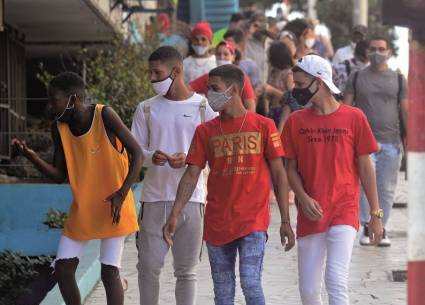
Young people are the ones who most often transit as asymptomatic. Author: Abel Rojas Barallobre Published: 19/01/2021 | 12:03 am
Where were you? Who did you meet? These and many other questions make up the survey that, with rigor and specificity, is carried out on each person who, confirmed as positive to COVID-19 or as a suspect, arrives at a hospital in our country.
It seems routine, but it can be very overwhelming, both for the patient, who suffers from that indescribable mixture of fear, uncertainty and anxiety; and for the health personnel who, with the required clothing, approach him/her without wanting to violate the health protocols, although with the desire to make him/her feel better.
This is what Niurka Molina Aguila, a specialist in II degree in Hygiene and Epidemiology, tells us, who carried out numerous surveys of this type as part of her work at the Pedro Kourí Institute of Tropical Medicine (IPK).
“Do you know what is the most important and, at the same time, most overwhelming, especially for the patient? It is necessary to answer these questions by appealing to the memory as accurately as possible because it is urgent that the answers refer to the 14 days prior to detection. This is the only way we can properly follow the transmission chain,” she assures us.
It is hard to imagine, but this is the day-to-day work of epidemiologists and other specialists who have been working for months in the midst of a scenario as hostile as the one imposed by COVID-19 on the world.
“The greatest danger of this disease lies not only in the very act of suffering it, but in asymptomatic people who, precisely because they do not feel anything that alarms them, carry out their usual activities and have contact with others, and become carriers with the same risk of transmission as those who do manifest the symptoms.
“Who are these asymptomatic people? You, me, that one, her…, but fundamentally the young people. People over 59 years and children under one year are essentially symptomatic, the rest, adolescents, young people and adults of less age, can carry the disease without suspicion. Til/khat is why it is vital to respect to the letter the established biosecurity norms”.
I do not feel, but I suffer
Based on research carried out at the IPK since last year (which has not been published), when cases of the disease began to be reported in the country, it has been assessed during all this time that about 63 percent of the people identified as positive were asymptomatic. This figure, logically, increases as contact searches are carried out through active surveillance, that is, through research.
The also Master in Infectious Diseases specifies that this study covered Havana, fundamentally, but it will continue to evaluate the results according to a better work of prevention and control of COVID-19. “The disease has been known gradually, as people have become sick.
“Much is still unknown, and so describing symptoms is complex. We already see that sometimes the loss of taste and smell are the only symptoms, even, of the disease. Until it was proven in several patients, it could not be described as an associated symptomatology, and this has happened with other aspects.
“The main thing is to respect the established sanitary norms. We cannot get tired of repeating them and enforcing them, because it is the only way we have to make it clear that this disease will not disappear completely, but rather that we will live with it as a seasonal disease, like H1N1 or others.
-Even if they are asymptomatic, can these people suffer from the sequelae of the disease?
-Yes, it is possible. The sequelae left by COVID-19 have already been described in healthy people who suffered from it. Having symptoms or not, does not necessarily condition the appearance of the sequelae, but when in doubt it is better to avoid contagion.
-The vaccine is the hope…
-Because of our human condition, we need hope to move forward. Certainly, we are anxiously waiting for the vaccine, but the population must know that every vaccine has a time to raise the immunity of the organism. That we vaccinate ourselves today does not mean that tomorrow we are already immune to the virus, especially when new strains are reported from time to time.
“There are vaccines that require two doses, and completing the cycle is essential. However, from the appearance of new strains, it is preferred in not few cases to delay the application of the second dose, and this prolongs the immunization process”.
The doctor, also researcher and assistant professor, underlined that until there is not a high number, very high of vaccinated and immunized people, one will not be out of the greatest danger and never absent completely.
The Cuban population must be informed and correctly oriented, based on the results of the researches carried out and the patients’ reactions when they receive the vaccine.
“I do not intend to alarm, but it must be taken into consideration that another new strain of the virus may emerge and the vaccine may not have the capacity to face it, so it will be necessary to continue studying and creating.
“The health measures that are so much repeated today in the different media are for life, because from now on the world will no longer be the same as the one we knew before the pandemic.
“The family must insist on their children and demand that they respect these measures, because one of the greatest dangers of this pandemic is that health services will collapse, as has happened in other nations. Not only do they collapse because people get sick, but because they don’t avoid getting sick.
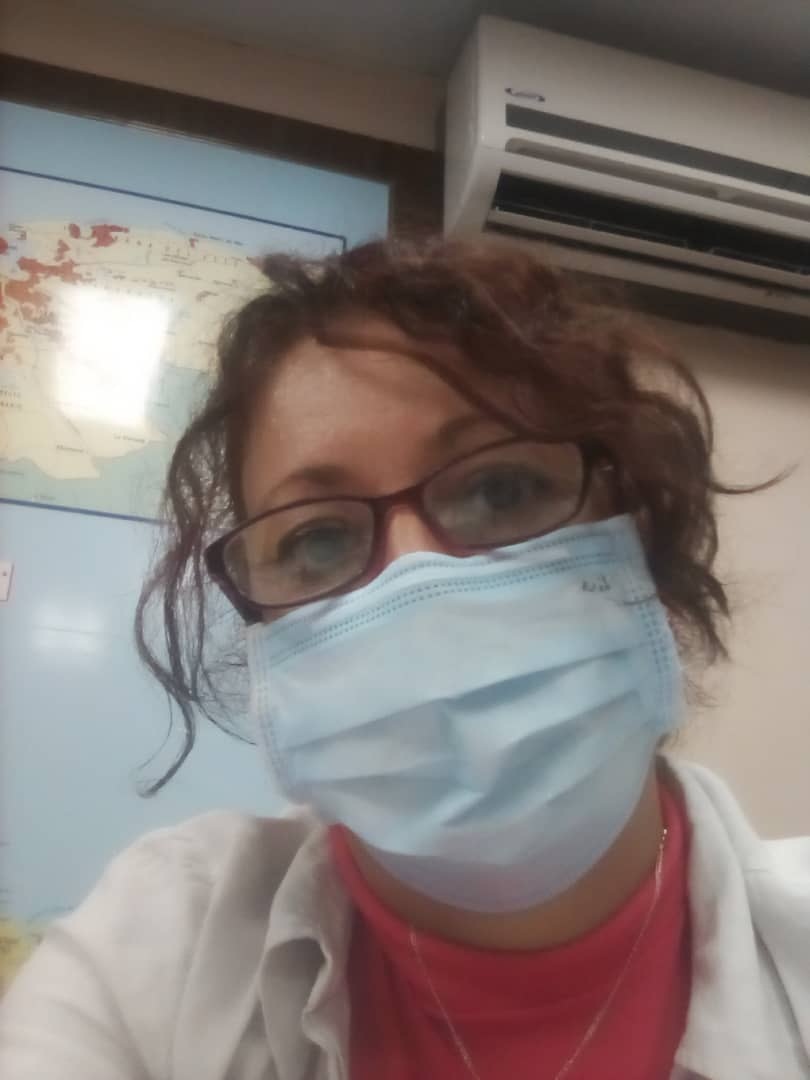
Niurka Molina Aguila, specialist in II degree in Hygiene and Epidemiology, researcher at the Pedro Kourí Institute of Tropical Medicine Photo: Courtesy of the interviewee
Molina Águila also mentioned the process of surrendering patients as convalescents. “Many times it is the time to complete the questionnaire that, when they first arrived at the institution, they could not continue with its completion”.
She emphasized that we should not go to closed places or places where crowds predominate, that the nasobuco should be worn correctly, that frequent hand washing should be deep, that when coughing or sneezing we should protect ourselves with our forearms, that we should maintain distance between one person and another.
“You, me, him, her… any one of us can transmit the disease without knowing it, and that’s what you have to understand. To the extent that someone who lives with other people takes better care of their health, their love and integrity cannot be questioned. These are not times to love as in the old days, but to demonstrate that by taking care of our life, we take care of the lives of others.
Subscribe to Blog via Email
| M | T | W | T | F | S | S |
|---|---|---|---|---|---|---|
| 1 | 2 | 3 | 4 | 5 | 6 | |
| 7 | 8 | 9 | 10 | 11 | 12 | 13 |
| 14 | 15 | 16 | 17 | 18 | 19 | 20 |
| 21 | 22 | 23 | 24 | 25 | 26 | 27 |
| 28 | 29 | 30 | 31 | |||

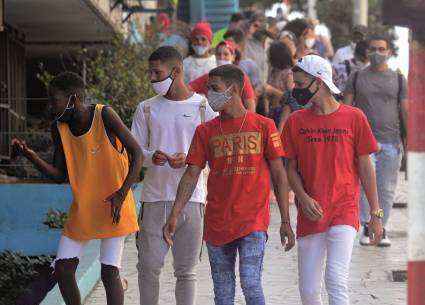
You must be logged in to post a comment.